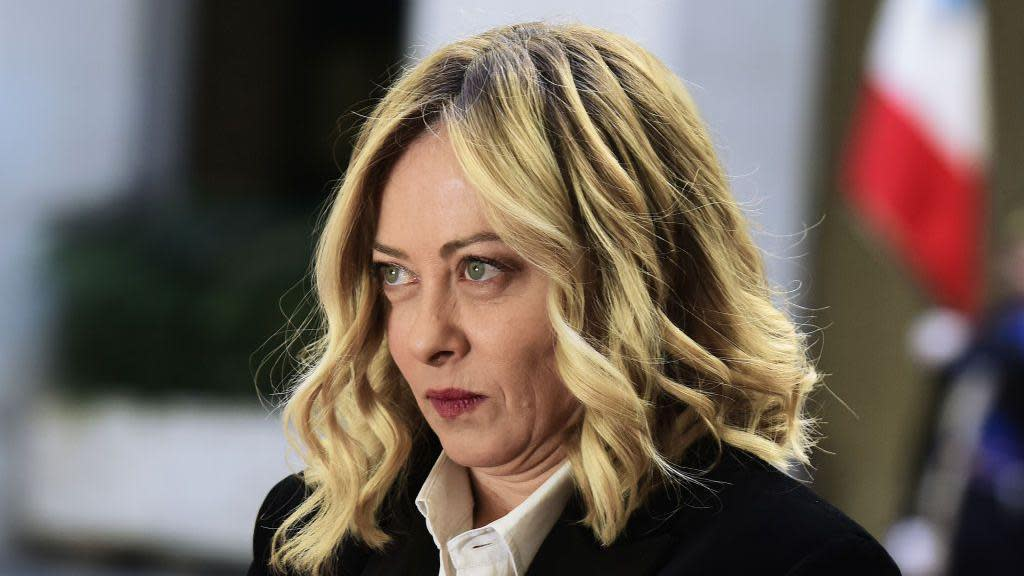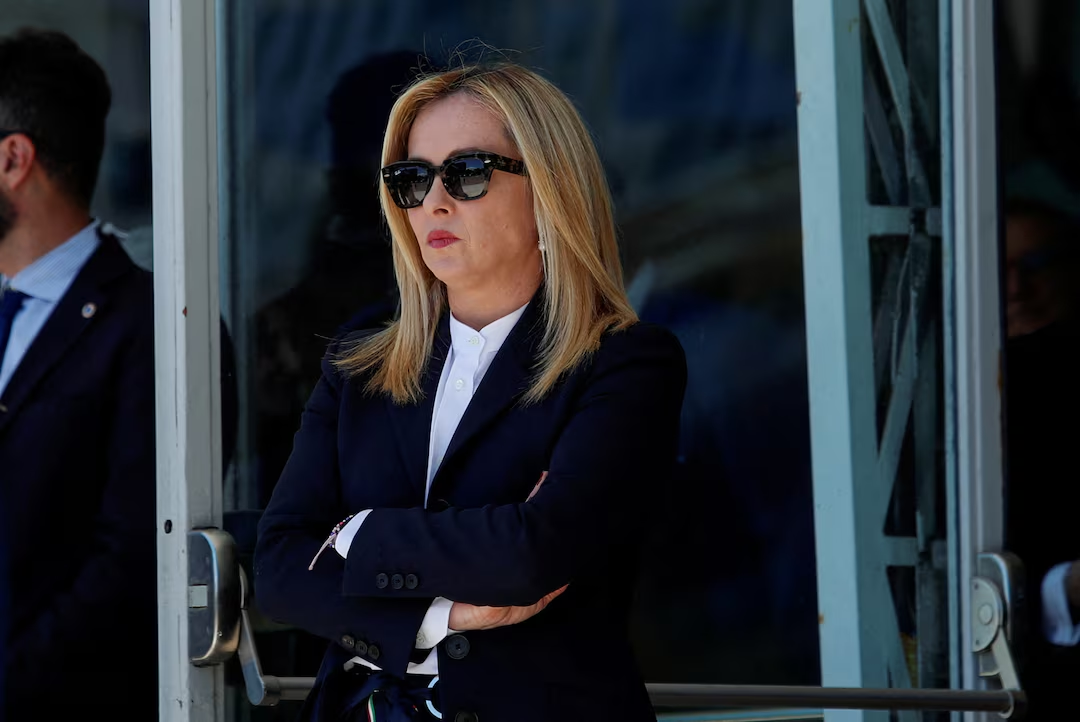The Italian Prime Minister, Giorgia Meloni, has found herself embroiled in a legal and political controversy following her government’s decision to release a Libyan police officer wanted by the International Criminal Court (ICC) for alleged crimes against humanity.
This unexpected move has raised questions about Italy’s adherence to international law and its relationship with the ICC, while simultaneously igniting a political storm domestically. The incident has led to a judicial investigation into Meloni and other top officials in her administration.
The Case of Osama Elmasry Njeem and ICC’s Demand for Accountability
Osama Elmasry Njeem, also known as Osama Almasri Njeem, is a senior Libyan police officer accused of heinous crimes, including murder, torture, rape, and other crimes against humanity.
As the head of the Tripoli branch of the Reform and Rehabilitation Institution—a network of detention centers notorious for human rights abuses—Njeem was implicated in atrocities committed since February 2015.
The ICC had issued an arrest warrant for Njeem as part of its broader efforts to prosecute individuals responsible for grave crimes in Libya, a nation plagued by ongoing conflict and instability since the NATO-backed overthrow of Muammar Gaddafi in 2011.
Njeem’s arrest in Turin earlier this month marked a significant development in the ICC’s pursuit of justice. However, this progress was abruptly overturned when the Italian government released Njeem just two days later, repatriating him to Tripoli via an official state aircraft.
The ICC, which had not been consulted about this decision, demanded an explanation from Italy. The court’s concern was rooted in the fact that Njeem’s release undermined its authority and jeopardized ongoing investigations into crimes in Libya.
Read : Albania PM Goes Down on One Knee to Gift Scarf to Italy PM Meloni on Her Birthday
Italy’s Interior Minister Matteo Piantedosi defended the government’s actions, claiming that Njeem was repatriated for “reasons of state security.” However, this justification has been met with skepticism both domestically and internationally.
Read : Giorgia Meloni: The First Woman Prime Minister of Italy and the Most Powerful Woman in the World
Opposition leaders in Italy have ridiculed the explanation, demanding greater transparency and accountability. The ICC’s chief prosecutor has expressed alarm over the incident, underscoring the importance of international cooperation in holding perpetrators of crimes against humanity accountable.
Judicial Investigation into Giorgia Meloni’s Government
The release of Njeem has triggered a judicial investigation into Prime Minister Giorgia Meloni, Justice Minister Carlo Nordio, Interior Minister Matteo Piantedosi, and the cabinet undersecretary for intelligence matters.
The allegations against them include aiding and abetting a crime and the misuse of public funds. These are serious charges that carry significant legal and political implications.
In a video statement posted on social media, Meloni acknowledged the investigation but vehemently denied any wrongdoing. She emphasized that she “will not be blackmailed” or “intimidated” by the inquiry, framing it as an attempt to undermine her government. This defiant stance reflects her broader political approach, characterized by a willingness to confront challenges head-on.

The investigation has placed Meloni’s government under intense scrutiny, with critics accusing it of undermining the rule of law and damaging Italy’s international reputation. The opposition has seized upon the controversy as an opportunity to challenge the government’s credibility, demanding full disclosure of the circumstances surrounding Njeem’s release.
Justice Minister Nordio and Interior Minister Piantedosi are scheduled to address parliament to provide further details about the decision.
This parliamentary session is expected to be highly contentious, as lawmakers from across the political spectrum seek answers about an incident that has not only strained relations with the ICC but also raised fundamental questions about Italy’s commitment to justice and human rights.
Implications for Italy’s Relationship with the ICC and International Law
The release of Osama Elmasry Njeem has cast a shadow over Italy’s relationship with the ICC and its broader commitment to international law.
As a member state of the ICC, Italy is obligated to cooperate with the court in the arrest and prosecution of individuals accused of crimes against humanity, war crimes, and genocide. By releasing Njeem without consulting the ICC, the Italian government has been accused of undermining these obligations and setting a dangerous precedent.
This incident has also highlighted the complex interplay between national security concerns and international justice. The Italian government’s decision to repatriate Njeem for “reasons of state security” raises questions about the extent to which national interests can justify actions that contravene international law.

Critics argue that such justifications risk eroding the credibility of the ICC and weakening the global framework for accountability. Moreover, the controversy has exposed divisions within Italy’s political establishment regarding the country’s approach to international law and human rights.
While the government has defended its actions as necessary for national security, opposition leaders have accused it of prioritizing short-term political considerations over long-term commitments to justice and accountability.
This tension reflects broader debates about the role of international institutions in addressing complex issues such as conflict, migration, and security.
The incident has also had broader geopolitical implications. Libya remains a focal point of instability in the Mediterranean region, with ongoing conflict and human rights abuses posing significant challenges for neighboring countries, including Italy.
By releasing Njeem, the Italian government may have sought to strengthen ties with Libyan authorities, but this move risks alienating other international partners and undermining collaborative efforts to address the root causes of instability in the region.

The investigation into Prime Minister Giorgia Meloni and her government represents a significant test of Italy’s commitment to the rule of law and its relationship with international institutions.
The release of Osama Elmasry Njeem has sparked a political and legal crisis, raising questions about Italy’s adherence to its obligations under international law and its priorities in addressing complex challenges such as security and justice.
As the investigation unfolds, the Italian government will face mounting pressure to provide a clear and credible explanation for its actions.
At the same time, the incident underscores the importance of strengthening international cooperation and accountability mechanisms to ensure that individuals accused of crimes against humanity are held accountable for their actions.
The controversy surrounding Njeem’s release serves as a reminder of the challenges and complexities involved in pursuing justice in a globalized world. It highlights the need for greater transparency, accountability, and collaboration among nations to uphold the principles of justice and human rights.
As Italy navigates this crisis, its actions will have far-reaching implications for its domestic politics, its relationship with the ICC, and its role in addressing the broader challenges of conflict and instability in the Mediterranean region.

